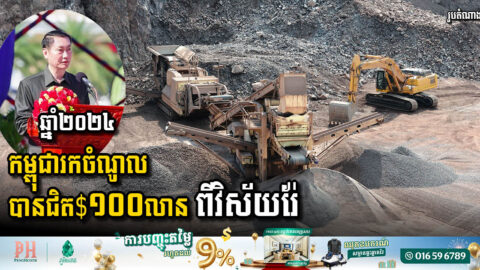Cambodia’s Mining Sector Sees Significant Revenue Growth in 2024
In a notable achievement for Cambodia, the Ministry of Mines and Energy reported nearly USD 100 million in non-tax revenue from the mining sector in 2024, reflecting an impressive increase of approximately 79% compared to the previous year. This growth highlights the country’s expanding mining activities, which now include numerous sites dedicated to both domestic […]
ADB Unveils USD 10 Billion Investment to Realize ASEAN Power Grid Vision
In a bold move that could reshape the energy landscape of Southeast Asia, the Asian Development Bank (ADB) has announced a groundbreaking investment plan of up to USD 10 billion aimed at realizing the ASEAN Power Grid initiative. ADB President Masato Kanda made the announcement during a meeting of the Board of Directors in Milan […]
Seventeen Japanese Companies Commit to Reducing Greenhouse Gas Emissions in Cambodia
In a significant step towards combating climate change, 17 Japanese companies have pledged to engage in greenhouse gas emission reduction initiatives in Cambodia. This announcement was made by HE Eang Sophallet, Minister of Environment, during a recent meeting with Kohei Wakabayashi, President of the Japan External Trade Organization (JETRO), on May 13, 2024. During the […]
Major Investment Boost for Cambodia’s Oil Refining Sector
In a promising development for Cambodia’s energy sector, three Chinese companies have recently unveiled plans to invest in the nation’s crude oil refining industry. This significant step is poised to enhance Cambodia’s energy independence while driving economic growth. Beijing Scitech Holdings Co., Ltd., Guanzun Energy Investment Co., Ltd., and now Beijing Sainte Holding Co., […]
Ministry of Environment to Distribute 3 Million Saplings in Cambodia’s Green Initiative
In a significant move towards enhancing the country’s green cover, the Ministry of Environment has announced plans to distribute an additional 3 million saplings to citizens. This initiative aims to bolster Cambodia’s efforts in combating climate change and achieving carbon neutrality by 2050. During a meeting with Ms. Bridgette Walker, Chargé d’Affaires of the US […]
Laos Commences Construction of USD 360 Million Hydropower Dam for Electricity Export to Vietnam
On April 29, 2025, Laos officially marked the groundbreaking of the Nam Neun 1 hydropower dam, a significant project with a planned capacity of 124 megawatts. With an investment of approximately USD 360 million, this facility is set to primarily supply electricity to Vietnam. The ceremony was attended by prominent officials, including His Excellency Sonexay […]



 ខ្មែរ
ខ្មែរ







